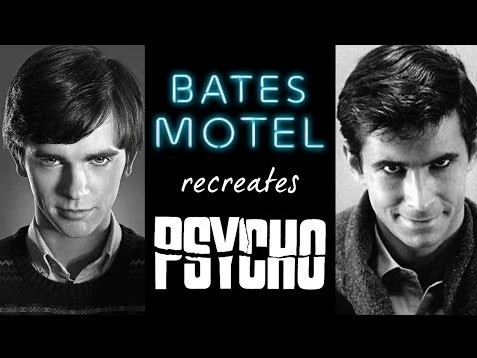
Alfred Hitchcock’s Psycho (1960) remains one of the most iconic horror thrillers of all time, leaving an indelible mark on cinema with its psychological depth, shocking twists, and unforgettable characters. Decades later, Bates Motel (2013-2017) reintroduced audiences to Norman Bates, offering a fresh yet deeply connected narrative. While the two works are distinct in their storytelling, they share many haunting similarities that bind them into a single, terrifying universe.
1. Norman Bates: The Evolution of a Monster
In both Psycho and Bates Motel, Norman Bates is a deeply troubled young man grappling with a fractured mind. The film presents him as an already fully-formed killer, while the series explores his descent into madness. Freddie Highmore’s portrayal in Bates Motel offers a nuanced, step-by-step breakdown of Norman’s transformation, whereas Anthony Perkins in Psycho presents the chilling end result—a man wholly consumed by his inner demons.
2. The Mother-Son Dynamic
The relationship between Norman and his mother, Norma Bates, is at the heart of both stories. Psycho reveals Norma as a looming psychological presence in Norman’s mind, while Bates Motel gives her a full-fledged character in the form of Vera Farmiga’s captivating performance. The show explores their intense, codependent bond in depth, making Norma a more sympathetic figure before her inevitable fate mirrors the backstory hinted at in Psycho.
3. The Iconic Bates Motel and House
Both the movie and the series prominently feature the eerie Bates Motel and the ominous house on the hill. These settings serve as characters in their own right, trapping Norman in a place where his darkest impulses can fester. Bates Motel builds upon the foundation laid by Psycho, adding layers to the motel’s history and the events that shaped Norman’s psyche.
4. Psychological Horror and Suspense
Hitchcock’s Psycho is a masterclass in suspense, with its chilling twists and psychological complexity. Bates Motel captures that same unsettling atmosphere, slowly unraveling Norman’s fractured mind over five seasons. The series cleverly weaves in elements from the film, such as Norman’s growing detachment from reality and his disturbing habit of donning his mother’s persona.
5. The Tragic Fate of Marion Crane
One of the most direct connections between the two is the character of Marion Crane, originally played by Janet Leigh in Psycho. Bates Motel reimagines this iconic role, casting Rihanna as Marion and delivering a unique twist on her fate. While the show stays true to many Psycho elements, it subverts expectations, offering a fresh perspective on a well-known story.
6. A Modern Reinterpretation of Classic Horror
While Psycho is a singular, self-contained story, Bates Motel expands on its universe, modernizing the narrative while staying true to its core themes. The series takes creative liberties but never strays too far from the essence of what made Psycho so haunting. The slow unraveling of Norman’s psyche, the tension-filled storytelling, and the exploration of familial trauma make Bates Motel a compelling companion piece rather than just a prequel.
Conclusion
Both Psycho and Bates Motel masterfully explore the mind of Norman Bates, each in its own unique way. While Psycho remains a cinematic masterpiece that defined the horror-thriller genre, Bates Motel offers a deeper dive into the complexities of Norman’s life, providing a rich backstory that enhances the original film. Together, they create a chilling, interconnected experience that continues to captivate and terrify audiences across generations.
